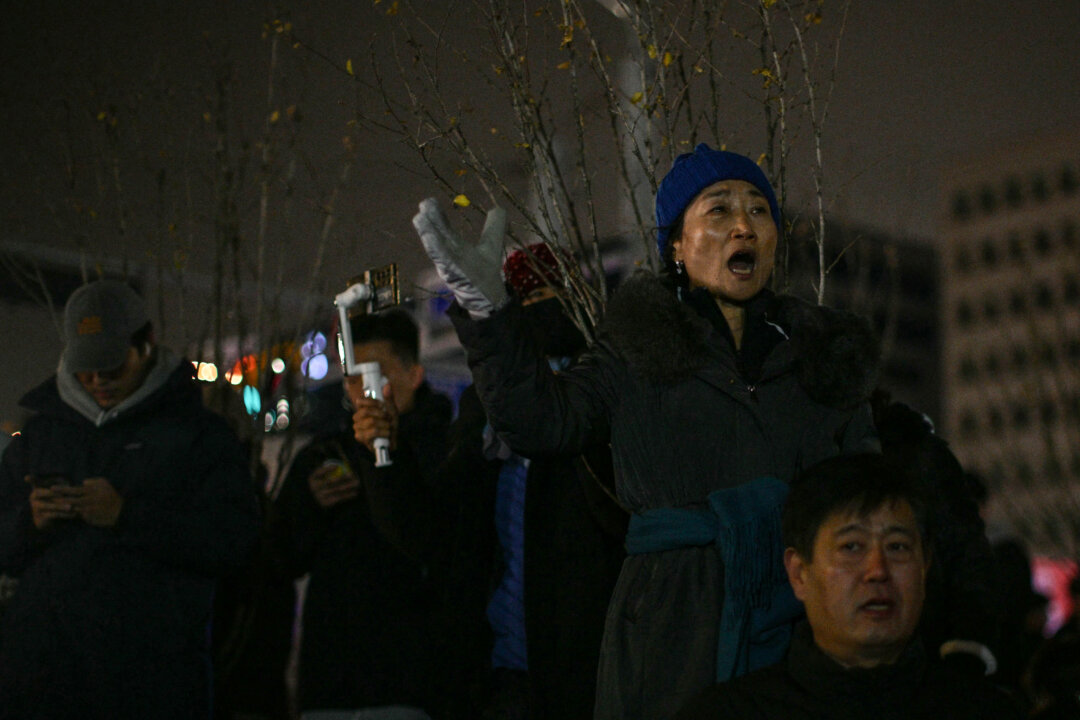South Korean President Yoon Suk-yeol’s martial law order marked the first time in more than 40 years the country had come under military rule.
South Korean President Yoon Suk-yeol’s decision to declare martial law on Dec. 3 startled citizens across his country.
While Yoon reversed the decision after only a few hours, many South Koreans are left wondering about the lasting impacts his decision will have on the nation.
Kim Tae-young, a 62-year-old resident of Gyeonggi-do Uijeongbu, told The Epoch Times he had watched Yoon’s initial broadcast declaring martial law late on the evening of Dec. 3, and couldn’t sleep a moment after that.
He said he continued to watch the situation unfold until the end when Yoon agreed to lift the martial law order after about six hours.
“It felt like the sky was collapsing. Really, it felt like our country, in 2024, was going through something we experienced 30–40 or even 40–50 years ago,” Kim said.
Until this week, South Korea hadn’t experienced martial law for more than 40 years.
Prime Minister Choi Kyu-hah imposed martial rule in 1979, following the assassination of President Park Chung-hee, who had himself seized power through military force in 1961.
South Korean Maj. Gen. Chun Doo-hwan later usurped Choi and extended martial law into 1981.
“I was really surprised and thought, ‘Did I just travel back to the 1970s?’” Lee Da-bin, a 21-year-old university student, told The Epoch Times on Dec. 4.
Lee Da-bin was among those who gathered near the National Assembly in Seoul, joining in protests against the martial law order as lawmakers rushed to undo the president’s martial decree.
The martial law instructions prohibited political activity, including gatherings of the National Assembly and public protests.
Nevertheless, demonstrators began to clash with troops around the National Assembly shortly after Yoon announced the order.
Amid the chaos, lawmakers staged a vote challenging Yoon’s martial law decree.
Han Jong-nam, a 48-year-old programmer, said the initial gathering at the National Assembly was smaller than he expected. But by 1 a.m. local time, the crowds of protesters had grown.
Han told The Epoch Times he was grateful to see the troops withdraw from the assembly building even before Yoon lifted his martial law order.
Yoon’s Decision Divides Support Base
Announcing his martial law decree, Yoon accused his political opposition, led by the Democratic Party, of sympathizing with North Korea and working to obstruct the work of the government.
Yoon won office in 2022 but has struggled to advance his agenda through the opposition-controlled National Assembly.
Among his complaints, Yoon criticized the opposition lawmakers for seeking to impeach prosecutors and members of the executive branch.
Former Prime Minister Hwang Kyo-ahn, a member of Yoon’s People Power Party, expressed sympathy with Yoon’s decision-making, saying the national assembly had “become a dictatorship of the opposition party.”
The former prime minister said Yoon’s actions should be seen as a legitimate move to counter a pro-North Korean left wing and Yoon’s party should back his decision.
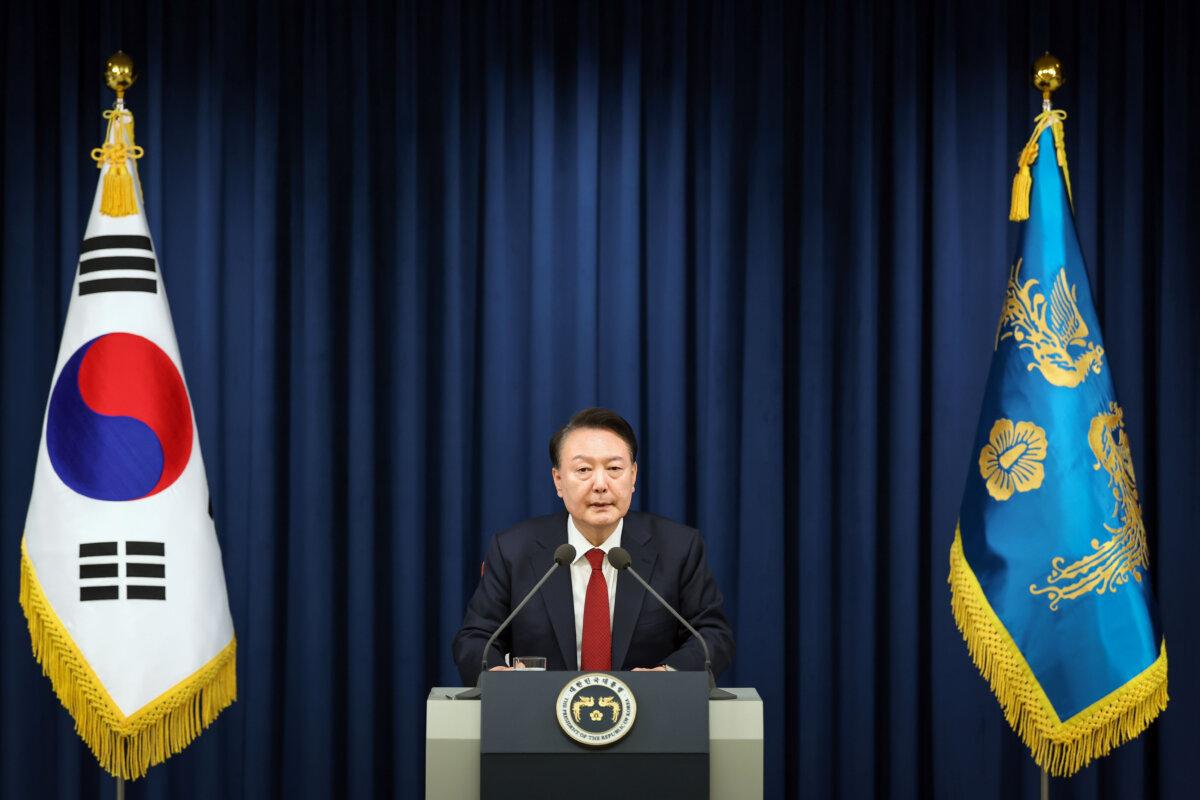
“The birth of a pro-North Korea leftist giant opposition party through election interference by anti-state forces is the root of all this trouble,” added former lawmaker Min Kyung-wook.
Others in Yoon’s party have been less favorable.
Han Dong-hoon, the leader of the People Power Party, distanced himself from Yoon’s martial law order and called for accountability for those involved in the decision-making process.
Lee Min-gu, a political activist who has previously supported Korea’s Democratic Party but supported the People Power Party for the past few years, said he could understand Yoon’s frustration with feeling the opposition had stymied his political agenda, but felt martial law was the wrong solution.
“I cannot agree with the idea that the president had no choice but to declare martial law. Martial law, in my opinion, is a card that should never be used, not even as a last resort,” he told The Epoch Times.
Martial Law Fuels Economic Uncertainty
The value of the South Korean won has tumbled this week after the short-lived martial law order.
On Wednesday, South Korean Finance Minister Choi Sang-mok announced his ministry would “inject unlimited liquidity into stocks, bonds, short-term money market as well as forex market for the time being until they are fully normalized.”
Yoon’s martial law declaration came just days after South Korea’s central bank lowered its economic growth projection for the country.
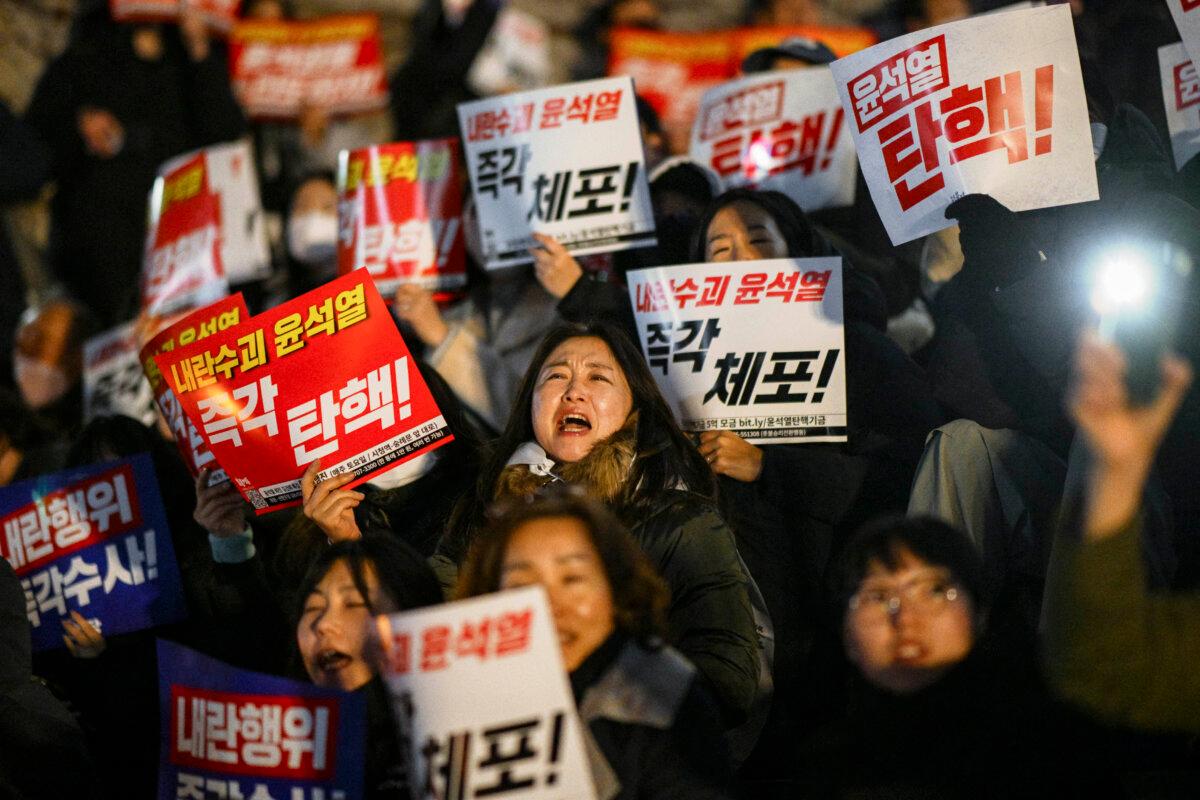
Han Jong-nam said the timing of Yoon’s martial law declaration was “like throwing oil on the fire.”
“I think it will take quite a while for South Korea to recover,” he added.
Kim predicted the economy will eventually stabilize, but said the issue is tied to Yoon’s continued political fortunes.
“The main problem right now is the president, and I think most of the people in this country feel that the president should not be in office. Once the issue with the president is resolved, I believe South Korea’s economy and other aspects will improve,” Kim said.
Impeachment Talk Grows
Lawmakers in the National Assembly have already begun advancing a bill to impeach the president, concluding that his martial law order violated South Korea’s constitution.
Speaking with The Epoch Times, Lee Da-bin said she hopes the president will be impeached by the end of the week.
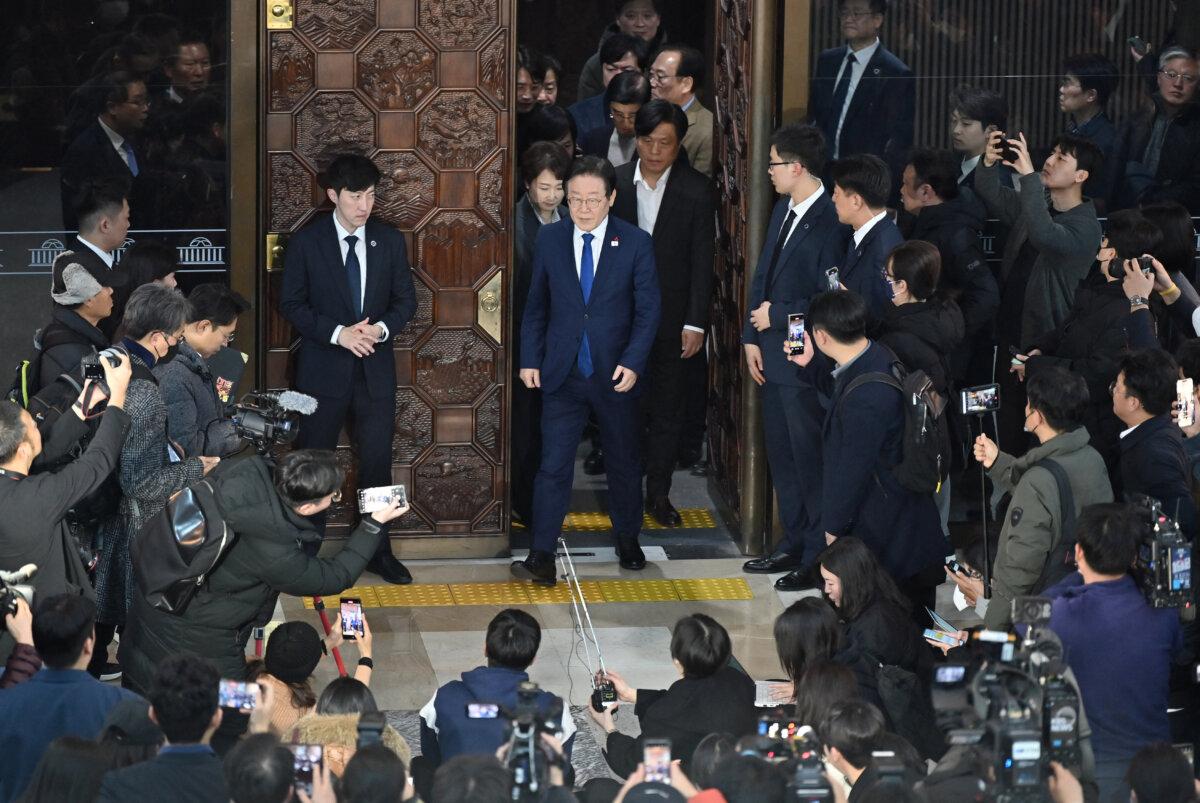
South Korean Defense Minister Kim Yong-hyun has offered his resignation.
According to Yonhap, the president’s office said several of his aides have also resigned since he lifted the martial law order. The president also cleared his schedule of events on Dec. 4. He has offered no public comments since lifting the martial law order.
“The first-term lawmakers of the People Power Party are in favor of impeachment because they don’t know anything, while the multi-term lawmakers are against impeachment because they learned from the impeachment of President Park Geun-hye,” Min, the former lawmaker, said.
“Han Dong-hoon is only against impeachment because he thinks he has no chance of becoming president if the presidential election is held right now.”
South Korea’s Future
Like others who watched the president’s martial law announcement, 24-year-old Seoul resident Lee Ji-won said she was left in shock.
“Is this really something that can happen in the 21st century? In a democratic country, how can such an emergency declaration be made, especially when the conditions for martial law don’t even apply? It was very absurd and unbelievable. I wondered, ‘How is the country supposed to move forward like this?’” she told The Epoch Times.
Lee Ji-won said the events of this week should inspire young South Koreans to pay closer attention to the political and civic developments in the country.
“I think we need to be more aware and awake. We should stop ignoring the news and current affairs. These days, social media is full of fun and entertaining things, and people’s interest in politics or current events seems to be decreasing,” she said.
“However, we need to focus more on those issues so that we can help lead South Korea in a better direction in the future.”
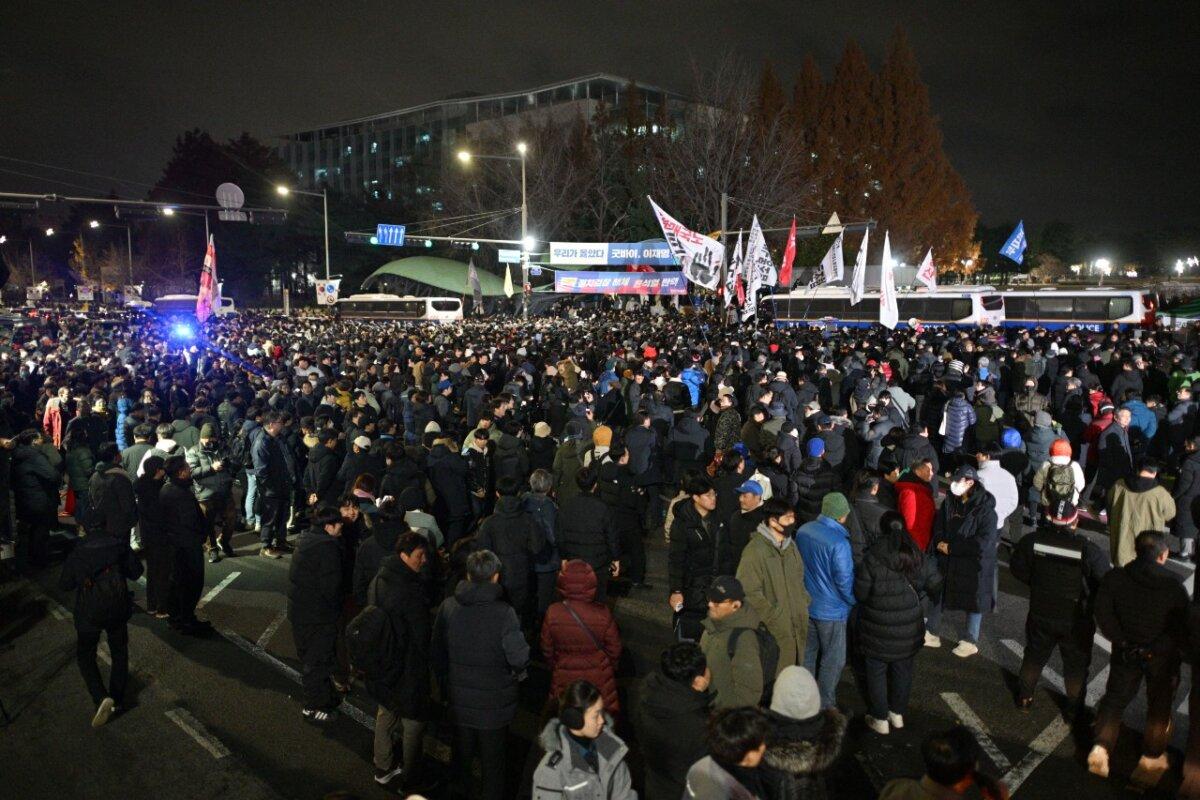
No Gyeong-hyo, a 62-year-old housekeeper from Seoul’s Eunpyeonggu district who voted for Yoon, said she has since soured on his leadership style.
“Seeing the way he’s been handling things—especially what happened yesterday—it’s clear that he acts impulsively, without meeting the necessary conditions or following proper procedures,” she told The Epoch Times.
“I’ve seen this pattern in all his policies up until now, and because of that, I’ve thought for a while that he should have been impeached already.”
Kim Yeon, Lee Yunjeong, Park Yohan, Reuters, and The Associated Press contributed to this report.
Correction: An earlier version of this article misspelled Kim Tae-young’s name. The Epoch Times regrets the error.

